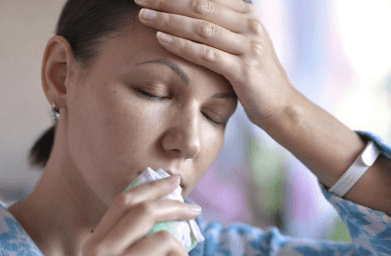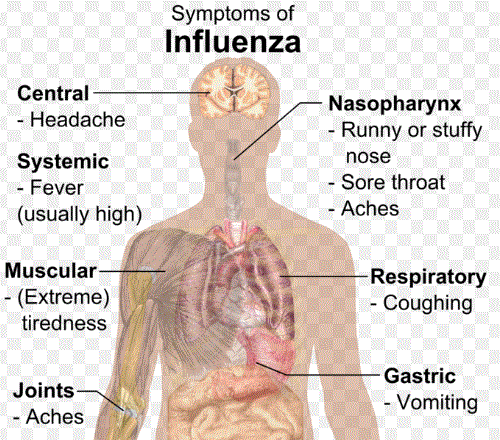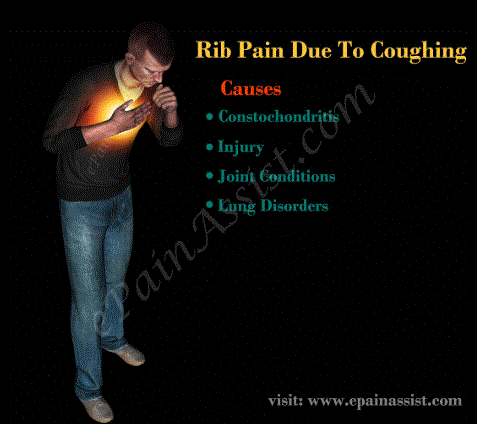Head Hurts When I Cough
Why Head Hurts When I Cough?
There are individuals who may experience say “Head Hurts When I Cough”. Although this may not be serious, it can cause a certain degree of discomfort and can be bothersome to others [1, 2, 3].

Headaches that develop or worsen by coughing is an example of a group of headaches known as exertion headache or activity-related headaches. Aside from coughing, a headache of this type also develops after blowing the nose, sneezing, crying, laughing, having a bowel movement or bending over [2]. This type of headache usually affect younger people and is more prevalent among adolescents up to 50 years of age [5].
It is thought that an exertion headache is caused by an increased blood pressure in the blood vessels of the brain also known as venous pressure. If the pain develops as a result of an activity, such as an exercise, the pain will start to fade as soon as the activity stops.
Although a majority of the occurrence of exertion headache is known to be harmless, it can also be a symptom of an underlying medical condition [1, 2, 3, 4, 5].
Types Of Exertion Headache
There are 2 known types of exertion headaches. They differ in the characteristic of the pain, cause and their duration [1, 2, 3, 4, 5].
Primary cough headache
This type of exertion headache occur abruptly and usually develop after a cough. It may last from a few minutes to a few hours. Individuals who have this type of headache report a sharp and stabbing pain that is felt in the whole head, especially at the back of the head. The pain eventually turns into a dull pain that lasts for a while [1, 2, 3, 4, 5].
Secondary cough headache
A secondary cough headache is known to last longer than the primary ones. Aside from the pain in the head, the person may also feel dizzy, feeling of being unbalanced or unsteady and feeling of almost fainting. The symptoms that are felt are not confined to the head and are felt on the whole body [1, 2, 3, 4, 5].

Causes
Although the exact cause of a primary cough headache is not known, malformations in the head are associated with the development of secondary cough headaches.
Those with a malformation in their skull may have a more frequent secondary headache. The cerebellum is the part of the brain that controls the sense of balance. A defect in this structure of the brain also increases the chance for a secondary headache [1, 2, 3, 4, 5].
Symptoms
Primary cough headaches
A primary cough headache appears with and after coughing and other types of straining activities such as crying, laughing or moving bowels. The sharp, splitting, or stabbing pain may usually last from a few seconds to up to a couple of hours. The initial pain may turn to a dull, aching pain that lasts for several hours. The pain is felt on both sides of the head and can be worse at the back of the head [1, 2, 3, 4, 5].
Secondary cough headaches
The symptoms of a secondary cough headache are similar to a primary cough headache with other accompanying symptoms. These symptoms include a longer lasting headache, fainting, unsteadiness, and dizziness [1, 2, 3, 4, 5].

Treatment
There are several treatment approaches available to manage the exertion headache [1, 2, 3, 4, 5].
Primary cough headache
The management of primary exertion headache is the use of medications that is taken every day. Some of the medications that may be prescribed by the physician may include acetazolamide, propranolol, and indomethacin.
The response of the individual to the medication will be evaluated by the physician to see if the management is appropriate [1, 2, 3, 4, 5].
Secondary cough headache
The development of this type of exertion headache is associated with malformations in the head. Because of this, medications may not work and the patient may need to undergo further medical tests to identify the best course of action. A surgery may be required to manage the condition [1, 2, 3, 4, 5].
Home Remedies
The use of several home remedies is effective in alleviating the headache caused by coughing [1, 2, 3, 4, 5].
- Consumption of food such as garlic or grapes is known to help in the pain if they are eaten for several days.
- Sucking a slice of lemon covered in black pepper and salt may reduce the person’s need to cough.
- Mixing grape juice with honey is an effective cure for a cough. Blending white pepper with honey in water may achieve the same effect.
- Gargling with salt relieves a sore throat and reduces the need to cough.
References
- New Health Advisor. (2017, March 20). Head Hurts When I Cough.New Health Advisor: http://www.newhealthadvisor.com/Head-Hurts-When-I-Cough.html
- Mayo Clinic Staff. (2015, February 19). Cough headaches. Mayo Clinic: http://www.mayoclinic.org/diseases-conditions/primary-cough-headaches/basics/symptoms/con-20024827
- R, A. (2011, February 12). Head Hurts When I Cough: Causes, Symptoms of Headache, Cough.Simple Remedies: http://www.simple-remedies.com/health-tips-3/head-hurts-when-i-cough.html
- Joseph, L. (2016). Head Hurts When I Cough.Med Health Daily: http://www.medhealthdaily.com/head-hurts-when-i-cough/
- Migraine.com. (2017). Exertion Headaches.Migraine.com: https://migraine.com/headache-types/exertion-headaches/
